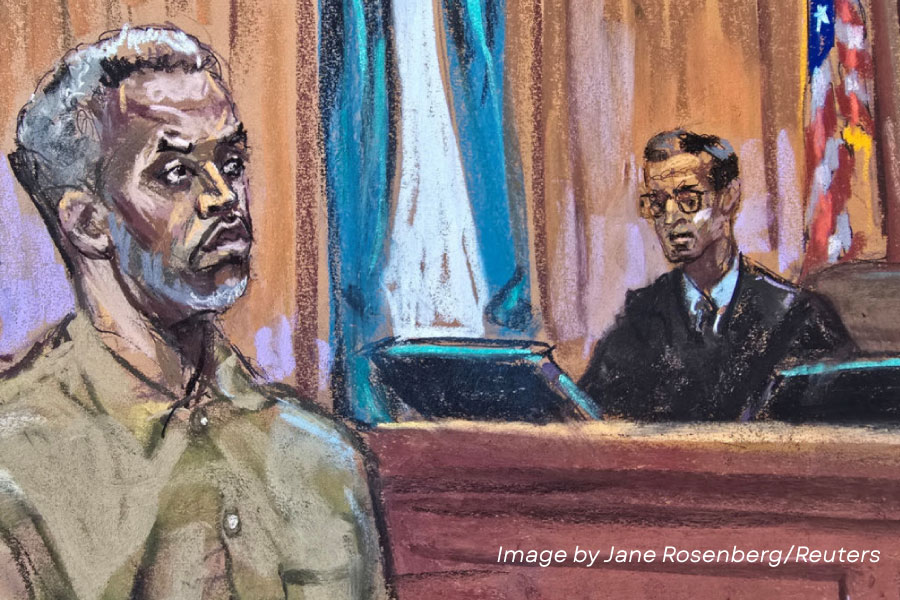
There’s no way to soften it: The Sean “Diddy” Combs verdict was a setback for those of us in the anti-human trafficking movement. Since the enactment of the Trafficking Victims Protection Act (TVPA) in 2000, those in the community have spent countless hours trying to teach police officers, prosecutors, judges, and juries that you can coerce labor or sex work in myriad ways other than pure physical restraint and force. The key is to get the victim to the point where they feel they cannot leave their circumstances, irrespective of the trafficker’s method(s) used to get and keep them there.
If I’m a trafficker, I don’t want to spend all my time and energy physically assaulting and restraining someone to get them to do what I want, though I will gladly do so to ensure they know the power structure. I’d much rather find ways to coerce you to do my bidding that take less effort on my part, such as threatening your family, threatening your standing in the community, creating or exploiting your drug addiction, or making you financially dependent upon me. Once I have you dependent upon me—and me alone—for your “safety,” drugs, housing, and income (if I ever let you have any), I no longer need to keep you chained up and in my presence 24 hours a day. You will obey me even if you don’t want to—and the consequences to you will be dire if you don’t! Once I have you in that place, I can give you a phone, a car, and a place to stay without having to worry that you will leave.
According to reports of her testimony, Cassie Ventura found out that disobedience to the requirements of Diddy meant she would be physically and sexually assaulted—there was even video proof. Yet at least one of the jurors on the case explained the evidence showed Ventura and others weren’t “forced” to engage in the sexual acts, but rather seemed to be “willing participants.” This view brings up so many issues that counteract the goals of the TVPA, including the fact that initial consent does not mean continued consent.
There is no doubt that proving commercial sex acts through force, fraud, and coercion can be very challenging. Most of these cases are investigated and prosecuted diligently outside of the public limelight, and great efforts are taken to show the multiple ways traffickers coerce their victims to comply. Violence is very often present, but so are more subtle forms of control like “if you love me …,” or drug dependence, or “I have nowhere else to live,” or “he’s the father of my kids,” or … The publicity of the Diddy trial and verdict will make it even more difficult for prosecutors and victims’ advocates to present these cases to juries.
It will be harder with this celebrity verdict, but those in the anti-trafficking community will continue to educate and push the evidence that proves coercion—in all its various forms.

Dave Rogers retired from the Federal Bureau of Investigation in July of 2015 after serving as a federal criminal investigator for over 23 years. He spent the last four years of his career as the manager of the FBI’s global Human Trafficking program within the Civil Rights Unit. He represented the FBI in the federal inter-agency work to combat human trafficking in the U.S. and abroad.
In addition to training federal law enforcement officers in the United States, Rogers has trained government units on human trafficking enforcement from Central and South America, Eastern Europe, Africa, and Asia.
Prior to leading the FBI’s anti-trafficking work, Rogers was an advanced instructor at the FBI Academy, where he trained new agents to conduct criminal investigations.
During his career, he worked Organized Crime matters, Labor Racketeering, Asset Forfeiture/Money Laundering, and International Terrorism. In 2013-2014, he spent four months in Afghanistan working on contract corruption investigations, including several labor trafficking matters. He started his law enforcement career as a Special Agent with the U.S. Department of Labor, Office of Inspector General and conducted complex fraud and bribery investigations. He also worked as a Special Agent with the U.S. Air Force, Office of Special Investigations in the Reserves, working on rape investigations, fraud, and counter-espionage matters.
Upon retirement from the FBI in 2015, Rogers transitioned to Hope for Justice to serve as the U.S. Program Director.
From 2017-2020, Rogers served as the Director of Law Enforcement Operations at the Human Trafficking Institute. His work also included designing and tailoring training to maximize the impact of specialized units in partner countries in Belize and Uganda.
He currently serves as a Strategic Advisor for Atlas Free, engaging with their partner organizations on the best ways to engage with law enforcement in their anti-trafficking work.
Rogers graduated from American University in 1991 with a B.S. in International Relations. He was on active duty in the U.S. Air Force from 1984-1988, and deployed in 1991 as part of Operation Desert Storm with the U.S. Air Force Reserves.